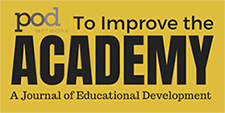Professional and Organizational Development Network in Higher Education

To Improve the Academy: A Journal of Educational Development
Date of this Version
Spring 2021
Document Type
Article
Citation
To Improve the Academy: A Journal of Educational Development (spring 2021) 39(3)
doi: 10.3998/tia.17063888.0039.309
Special issue: Educational Development in the Time of Crises
Abstract
When the global pandemic forced campuses across the United States to send students home in March 2020, instructors were thrown into triage mode, forced to rapidly transition their on-the-ground classroom curriculum to a format that could be completed remotely by students spread out across the country. At the same time, centers for teaching and learning (CTLs) also entered triage mode, puzzling over how to quickly but effectively provide appropriate training and meaningful support to prepare faculty for this rapid transition (Aebersold et al., 2020). The situation’s urgency, coupled with the significant constraints many CTL directors already experienced, necessitated creative, flexible, and, in some cases, unorthodox approaches to faculty development. This article describes the creation, implementation, and takeaways from our CTL’s response to this immense challenge. We retrospectively reflect upon how our center-of-one at a small private liberal arts college with no history of online education was able to build and take a 4-week experimental online training course for 13 faculty members and scale it up so that, by the end of 3 months, 105 participants, or over 80% of our institution’s full-time faculty, had completed a course in online teaching. In doing so, we identify four impactful practices that made our experience possible and that have potential future value, especially for small or under-resourced centers.
Included in
Curriculum and Instruction Commons, Higher Education Commons, Higher Education Administration Commons, Higher Education and Teaching Commons, Other Education Commons


Comments
License: CC BY-NC-ND